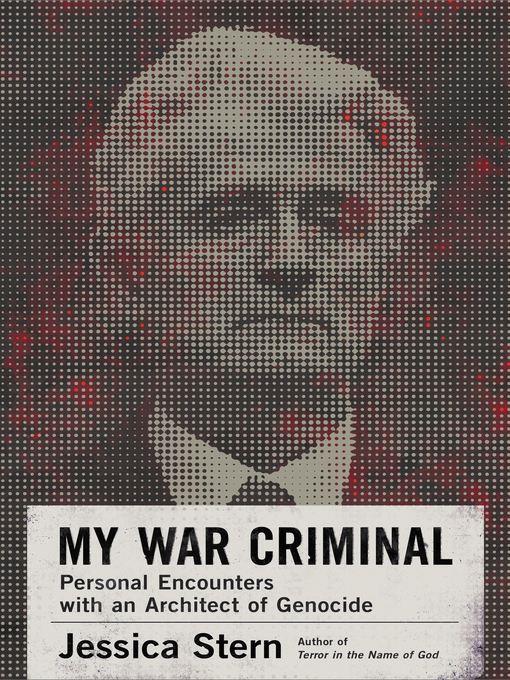
My War Criminal
Personal Encounters with an Architect of Genocide
کتاب های مرتبط
- اطلاعات
- نقد و بررسی
- دیدگاه کاربران
نقد و بررسی

October 15, 2019
This scrupulously researched work by a skilled interviewer of "imprisoned perpetrators" focuses on the making of the genocidal Bosnian Serb leader Radovan Karadzic. Between 2014 and 2016, Stern (Global Studies/Boston Univ.; Denial: A Memoir of Terror, 2010, etc.) held a dozen conversations with the war criminal, now imprisoned for life in the Scheveningen Prison in The Hague. Though interviews with such high-profile war criminals had not been sanctioned by the International Criminal Tribunal--the first international war crimes court established since the Nuremberg and Tokyo trials at the end of World War II--the ICT ultimately agreed, acknowledging Stern's meticulous methods and hoping her research might yield valuable information about Karadzic's motives. Karadzic came to power as the former Yugoslavia's ethnically divided federations began to declare their independence in the early 1990s, and the once-dominant Serbs of Bosnia, in the minority to the majority Bosnian Muslims, feared (or were incited to fear) that they were losing their status and privileges. The culmination of fear and hate erupted in the genocide at Srebrenica in July 1995, when the Bosnian Serb army captured the town and executed thousands of surrendered men and boys. Appearing as a cultured, intelligent "gentleman," Karadzic created a whole other entity as an "energy healer" and poet while on the lam for 12 years, and he believed that he was a hero for his beleaguered people. Stern's account of their interviews is a riveting battle of the wills, as the author chronicles her battle against Karadzic's manipulation and attempts to see some remorse. Yet he was unrepentant in protecting "his" people from exaggerated threats and demographic changes, and he used fearmongering tactics that Stern recognizes as being currently practiced by the U.S. government. Ultimately, the author provides a subtle, powerful illustration of terror that resonates today, especially regarding the resurgent white supremacist movement. The deep, extensive footnotes and detailed timeline attest to Stern's meticulous research. An utterly compelling chronicle from a master scholar and clear writer.
COPYRIGHT(2019) Kirkus Reviews, ALL RIGHTS RESERVED.

December 1, 2019
Stern (Pardee Sch. of Global Studies, Boston Univ.; Terror in the Name of God) here attempts to gain insight into the mind and actions of Radovan Karadzic (b. 1945), a former politician in Republika Srpska, an entity in Bosnia and Herzegovin. Karadzic, a Bosnian Serb, was the architect behind the massacre of thousands of non-Serbs during the Siege of Sarajevo between 1992 and 1996. Over a period of two years, from 2014 to 2016, Stern interviewed Karadzic at The Hague, where the former politician has been sentenced to a life term for crimes against humanity. Stern attempts to discover what led Karadzic, a psychiatrist, to fall into a life of fraud and, later, be responsible for genocide. The author allows readers to draw their own conclusions, suggesting that a sense of Serb nationalism drove Karadzic's actions, leading him to believe that ethnic cleansing would ultimately create the new Serb order he desired. Stern's book is a worthy complement to Robert Donia's Radovan Karadzic: Architect of the Bosnian Genocide. VERDICT An informative work for academic collections supporting studies in Balkan history.--Ed Goedeken, Iowa State Univ. Lib., Ames
Copyright 2019 Library Journal, LLC Used with permission.

December 23, 2019
Boston University global studies professor Stern (coauthor, ISIS: The State of Terror) delivers a fascinating and nuanced portrait of Bosnian Serb leader and convicted war criminal Radovan Karadžić.
A former poet and psychiatrist, Karadžić served as president of the Republika Srpska during the Bosnian War; after the war ended in 1996, he spent 12 years disguised as an energy healer before he was arrested and indicted for the mass murder of 8,000 mainly male inhabitants of Srebrenica, among other war crimes. Stern explores Karadžić’s family background and reveals how his politics were driven by fear and resentment of Muslims. She picks apart his rationalizations and obfuscations, yet notes that his claims about the “artificial” nature of the former Yugoslavia and the U.S. government’s “stigmatization” of Serbs have merit. Intriguingly self-reflective, Stern writes that though she couldn’t bring herself to look into Karadžić’s eyes, she found him to be “likable” and “charming” in their one-on-one interviews; she also admits to “harboring a secret, megalomaniacal dream—that I was going to get him to apologize.” (He didn’t.) This eloquent and revelatory book provides essential insight not just into the Balkan wars, but into the mechanisms of genocide and ethnic hatred all over the world.

January 1, 2020
Between 1992 and 1995, the region of Bosnia and Herzegovina erupted into an armed ethnic conflict similar to that in Rwanda. This genocide was sanctioned by a trio of leaders, including Radovan Karad[ic. In this intriguing study, Stern, a prominent scholar of trauma and global terrorism, profiles the many faces and facets of Karad[ic to illuminate a larger story about nationalism, fear, separatism, and dissension. Karad[ic was a trained psychiatrist, published poet, the first president of Republika Srpska, and a convicted war criminal. Stern's investigation stems from interviews conducted while he was imprisoned at the Hague, conversations held with family and associates, and insights gained from tours of significant places in his life. Her account also includes the story of how Karad[ic posed as energy healer Dr. Dragan Dabic while on the lam for over a decade. Ultimately, Stern draws chilling parallels between the war criminal and President Trump, including similarities in their tactics of fear-mongering and ethnocentrism, and asks us to question our own moral dexterity and susceptibility to such ethical collapses.(Reprinted with permission of Booklist, copyright 2020, American Library Association.)

























دیدگاه کاربران